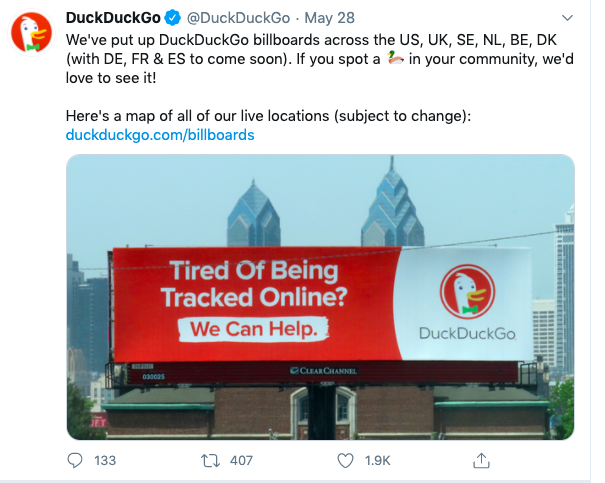Search engine alternative DuckDuckGo is taking big steps to change search forever. As it unveils new data that shows a hankering for search engine options, it wages war against the market dominator Google, and highlights the importance of advertising on other sites.
What is DuckDuckGo?
DuckDuckGo is an internet search engine which prides itself on not tracking its users. It has become a popular alternative as people become conscious of who their data is being shared with; DDG hides your IP address, doesn’t use cookies or store any personal data, and even they themselves can’t identify you. So, if you’re wary of what tech giants may be doing with your info, searching on DDG is a smart alternative.
In a recent study, DuckDuckGo found that if given a choice, up to a quarter of internet users would use a different search engine other than Google. This would see Google’s market share decrease by 20%.
The issue is: Google has made it very difficult for people to use alternatives. They own Android, pay millions to Mozilla to be the Firefox default (and have just renewed their contract), and billions more to Apple to be the same for Safari. Smaller search engines just can’t afford to keep up. But does this mean users have to suffer Google’s reign simply because they have the biggest budget?
With people exploring different options and the antitrust case building against them, DuckDuckGo’s data suggests Google may be forced to loosen their grip on the market.
DuckDuckGo’s search preference screen
In 2018, Google was hit with the largest-ever antitrust penalty handed out by the European Commission – $5 million.
One of its crimes was the way it cemented the dominance of its search engine in Android. It was possible to change the default from Google, but it was buried in Settings. Now, it presents three search alternatives in the ‘Android choice screen’ on setup. Who gets listed there is decided by auction.
DuckDuckGo’s new user research trialled offering many more search engine options than just the 3. It used eye-tracking analysis and different orders of the choices. Its findings showed:
- Users were willing to scroll to look at the entire list, often to find Google
- Google’s placement didn’t matter, if a user was loyal to Google, they’d hunt for them
- 20% of users selected an alternative, showing not all want to use Google
DDG’s findings are being used to bolster the cause for its alternative choice screen; it’s in talks with authorities in the UK, US and Australia about search preference menus. It argues that the demand for other search engines is there and it needs to be made easier for people to use alternatives.
Alternatives are stepping up their game
We’ve previously spoken about what Microsoft is doing that Google isn’t. Now, it seems others are joining the cause.
As regulators look to be stepping in to make things fairer, DuckDuckGo has become increasingly more aggressive in its advertising. To emphasise its ‘offline’ approach, it’s taken out 2,245 billboards in the US and 2,261 billboards in Europe. Its slogans are sharp and to the point: ‘Want the same internet but more privacy?’

It seems that a lack of awareness in the options plays a part in users’ habits. But if a choice screen was offered, the data does tell us that at least 20% would be walking away from Google.
What does this mean for search marketers?
Now, it’s more important than ever before to look at expanding the ad platforms you use. The DDG data shows that not everyone uses Google; Bing, DDG, Yahoo! etc. all see unique traffic. In fact, we recently put together a list of 16 alternatives places to advertise to highlight the importance of diversifying your PPC strategy.
Advertising on Microsoft is a great place to start. Microsoft Ads has a lot to offer and is an easy way to diversify your approach to paid search. With a huge Audience Network, your ads can run on sites such as DuckDuckGo, helping you to ensure you’re reaching all your potential customers.
Better yet, you can ensure your Google, Facebook and Microsoft Ads are up to scratch with the Adzooma platform. Free to use, our software uses AI to make managing, optimising and automating your campaigns easier than ever. So, you have more time to focus on the bigger picture – like whether you could get more business from smaller search engines, like DDG.
If you’re looking to get started, find out how to get set up on Microsoft Ads here. You should also take advantage of their great little offer; Microsoft will give you £100 in ad credits when you deposit £20. It looks like a lot of new customers could be on the horizon, doesn’t it?
Is Google’s reign finally ending?
Currently, DuckDuckGo has less than 1% of the market share, so the situation feels very David vs. Goliath right now.
However, Google has been in and out of trouble with the law regarding transparency. Whatever’s said, users can never be entirely sure what goes on behind closed doors. With such a dominant market share – 95% – it seems the only way is down.
DuckDuckGo’s new research highlights the importance of using search alternatives. Get ahead of your competition by securing your place on them and getting more customers for your budget today.




